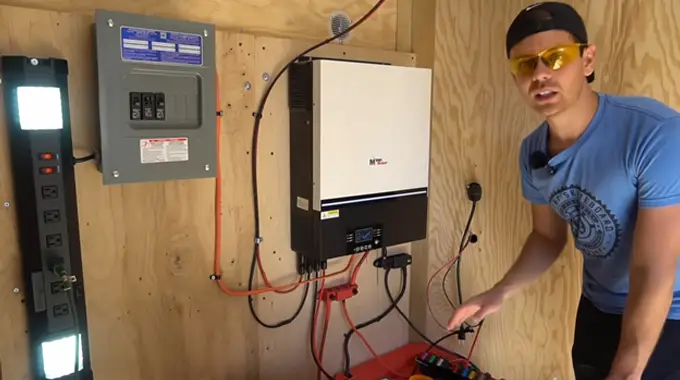Last Updated on April 20, 2023
Camping in an RV can be a great way to explore the outdoors without giving up all the comforts of home. If you’re not careful, it can also drain your battery rapidly.
The question therefore is, can you plug in an RV without a battery? Based on the converter you have, you might be able to connect the RV without the use of batteries.
If you have a “smart” converter, then you can usually plug it into an outlet without harming your battery. If you have an older “dumb” converter, then you could damage your battery by doing so.
In this post, we’ll take a look at the different types of converters, how they work, and what you need to know before plugging in your RV.
How to Plug in an RV Without a Battery Using a Converter ; 3 Factors
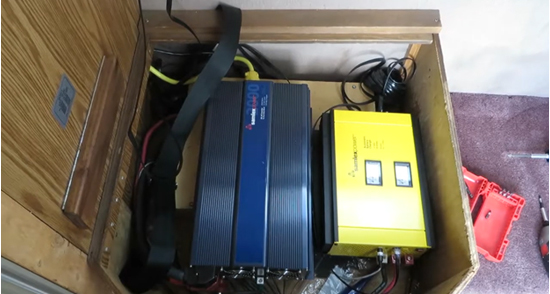
If your RV doesn’t have a battery, you can still use a converter to power your RV, you will just need to install one. Here’s what you need to know about installing and using a converter in an RV without a battery:
Choosing the Right Converter
Selecting the appropriate converter is important when plugging in an RV without batteries. The converter helps to regulate the flow of electricity from the shore power supply to the RV, and it also helps to protect the RV’s electrical system from damage.
A few factors to consider when choosing a converter, including the size of the RV, the type of electrical system, and the available shore power supply. With a little research, it is easy to find a converter that will work well for your needs.
For example, if you have a 30-amp RV with a 12-volt electrical system, you will need a 30-amp converter. If you have a 50-amp RV with a 110V system, you need a 50-amp converter. Once you have chosen the right converter, be sure to follow all instructions carefully to ensure safe and proper operation.
Find a Suitable Spot
You need a convenient place to plug in your RV when you’re using a converter. The first thing you’ll want to do is make sure that the area around the RV is free of debris. This includes making sure there are no branches or other objects that could fall and damage the RV.
Once you’ve found a spot that’s clear, the next step is to determine where the power source is. If you’re plugged into an outlet, you’ll need to ensure that it’s properly grounded. If you’re using a generator, you’ll want to be sure it’s placed in a well-ventilated area.
Next, connect the power source to the RV. If you’re using an extension cord, ensure it is properly rated for the power needs of the RV. Once everything is connected, you should test the system by turning on a few lights and appliances. If everything seems to be working properly, you can then enjoy your RV without having to worry about running out of battery power.
Installing the Converter
While many converters come with detailed instructions, some campers find the process of installing a converter to be somewhat confusing. With a few simple steps, anyone can install a converter while hooking up an RV without a battery.
First, locate the DC input on your RV’s electrical panel. This is usually clearly marked. Next, connect the positive and negative leads from the converter to the corresponding terminals on the DC input. Finally, plug the converter into a 120V AC outlet and you’re ready to go.
Installing a converter may seem like a tough task, but with a little know-how, it’s actually quite simple. And once you’ve done it, you’ll be able to enjoy home comforts while camping without worrying about your RV’s battery.
Things to remember: Troubleshooting Tips
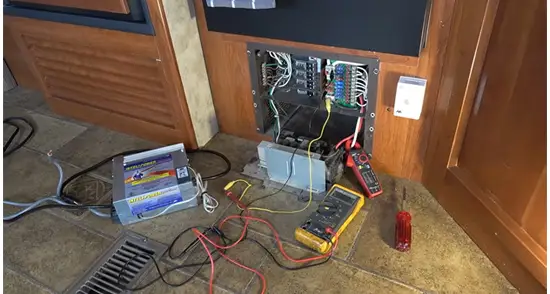
When you are plugging in your RV without a battery, many things can go wrong. The most common problem is that the converter will trip the circuit breaker. There are a number of things, including loose wiring, incorrect wiring, or a faulty converter.
If this happens, the first thing you should do is check the wiring. Make sure all of the connections are tight and secure. If everything looks good, then reset the circuit breaker and try again. If the problem persists, you may need a new converter.
Another common issue is that the RV will not charge the batteries. This can be caused by several factors, including a low voltage drop, an incorrect setting on the converter, or a faulty RV battery charger.
If you are having this problem, first check the voltage drop across the RV’s power cord. If it is low, then increase it by moving the switch on the converter to the “high” position. If this does not solve the problem, then check the settings on the battery charger and make sure they are correct.
Finally, if all else fails, then you may need to replace the charger. These are just a few of the most common problems that can occur with an RV without a battery. With a little troubleshooting, they are all easily resolved.
What Does an RV Converter Do
An RV converter is a device that is used to convert the AC power in your RV to DC power. This is necessary because the majority of RV appliances and electronics run on DC power. The converter takes the AC power from your shoreline or generator and converts it to DC power. This allows you to use your RV equipment and devices while you are away from an AC source.
Without a converter, you would not be able to use most of your RV’s features while dry camping or boondocking. Many RVs come equipped with a converter, but if yours does not, you can easily install one yourself. Converters come in different sizes, so be sure to get one that is powerful enough to meet your needs.
Types of RV Converters and How They Work
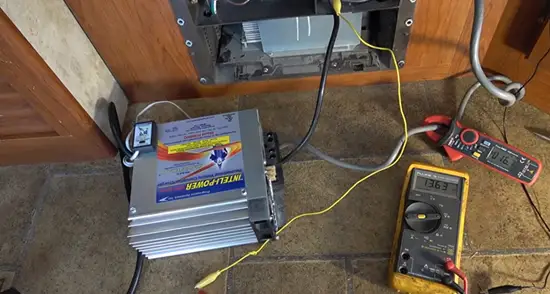
When shopping for an RV, it is important to understand the different RV converters available and their functions. So let’s look at three RV converter types and see how they differ.
Shore Power Converter
The most basic type of converter is the shore power converter, which allows the RV to be plugged into a standard 120-volt outlet. This type of converter is typically used for short-term camping, as it does not have enough power to run an RV’s appliances. Shore power converters allow you to plug your RV into standard household outlets, providing you with a reliable source of power.
There are a few things you should keep in mind when using a shore power converter. First, make sure that the outlet you are using is properly grounded.
Second, always unplug shore power before disconnecting it from the outlet. Finally, be sure to read the instructions carefully before use. You can ensure that your shore power converter will provide years of trouble-free service by following these simple tips.
Generator-Powered Converter
A more powerful option is the generator-powered converter, which uses a generator to create electricity. These converters are ideal for longer camping trips, as they can provide enough power to run all of the RV’s appliances.
Generator-powered converters are especially useful for RVs that do not have hookups to a campground or other source of power. Not only do they provide a convenient way to keep the lights on, but they can also help to save money by eliminating the need for expensive battery packs.
These are available in a variety of sizes and designs, making it easy to find one that meets the needs of any RV. With a little research, you can find the perfect converter for your next road trip.
Solar-Powered Converter
RV solar panels are a great way to generate electricity while on the road. They are relatively easy to install and can be used to power a wide variety of devices, from lights and appliances to televisions and computers. Best of all, they are environmentally friendly, generating clean, renewable energy that doesn’t produce any emissions.
There are several things to keep in mind when shopping for RV solar panels. First, consider the size of your RV and the amount of power you need to generate.
Consider the climate where you’ll be traveling. If you’re going to be in sunny regions most of the time, you’ll want to invest in more panels than if you’re just going to be using them occasionally.
What Happens When the RV Converter Goes Bad?
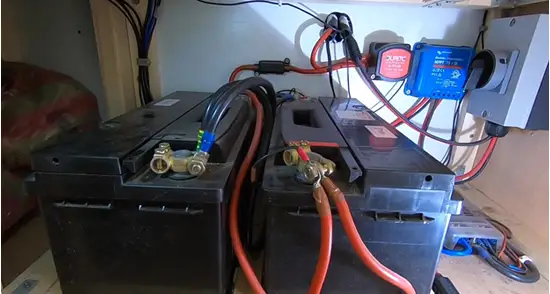
Without a converter, an RV would be unusable. So, what if the converter goes bad? There are a few things that can happen to the converter.
- The RV’s battery will not be charged. This means that the lights will eventually go out, and the appliances will not work. Second, the 12-volt DC devices will not work. This includes the water pump, furnace, and any other 12-volt devices. If the converter is not working properly, it could overheat and cause a fire.
- If you suspect that your RV converter is going bad, it is important to have it checked out by a qualified technician. They will be able to diagnose the problem and make any necessary repairs. In some cases, it may be necessary to replace the entire converter. This is usually only necessary if the converter is significantly damaged or if it has stopped working altogether.
FAQs
Listed below are some answers to some commonly asked questions related to the post:
Is an RV Battery Necessary?
RV batteries are necessary if you want to be able to use electrical appliances while your RV is not hooked up to shore power. Many people believe that they can get by without a battery, but this is simply not the case. Even if you are not planning on using any sort of electrical equipment, a battery is still necessary in order to start your RV’s engine.
Batteries are typically lead-acid batteries, which means that they need to be regularly maintained in order to prevent sulfation. If you do not have a battery, you will likely find yourself stranded at some point during your travels.
Can I Tow my Travel Trailer without a Battery?
Towing a trailer in the absence of a battery is illegal in almost every state. The battery is required to power the camper’s brake system if the camper becomes disconnected from the tow vehicle. Without a battery, the brakes could fail, causing the camper to become uncontrollable and pose a serious safety hazard.
The battery is needed to operate the trailer’s lights. Towing a trailer without lights is also illegal in most states. Not only is it unsafe, but it can also result in a traffic citation. If you’re planning on towing your travel trailer, be sure to bring along a fully-charged battery.
Can I Start my RV While Plugged into Shore Power?
Yes, If your RV is equipped with a generator, you can use it to provide electricity while traveling or camping. Most generators will automatically shut off when they sense that shore power is present. Some models may require you to manually switch the generator off when plugged in.
Consult your owner’s manual for specific instructions. Running a generator while connected to shore power is a great way to top off your battery or to keep your RV cool on hot days. Just be sure to follow all safety guidelines to avoid damaging your RV or causing an accident.
Will the RV Fridge Work Without a Battery?
RV refrigerators are not like conventional ones that you would find in a home. They are designed to run off either 120V AC power or 12V DC power, which is provided by the RV’s battery. Without the battery, the RV fridge will not be able to run.
The battery is used to power the front thermostat and control panel, as well as the front LEDs and any other added features. If you are planning on being without power for an extended period of time, it is best to invest in a portable generator or solar panel to keep your RV fridge running.
Last Words
Now you get full explanation, if you can plug in RV without battery or not. It is technically possible to operate an RV without a battery, it is not advisable. RVs rely on batteries to power many of their essential systems, including the lights, ignite the stove, and power the water pump.
Without a battery, these systems will not work. Batteries help to regulate voltage levels and prevent damage to sensitive electronics. For these reasons, it is always best to have a fully charged battery on hand when operating an RV.
If for some reason you find yourself without a battery, you can follow the tips outlined in our article. It will provide power to the RV’s essential systems until the battery can be replaced. We hope you found this article helpful. If you have any further questions, please feel free to reach out to us.
